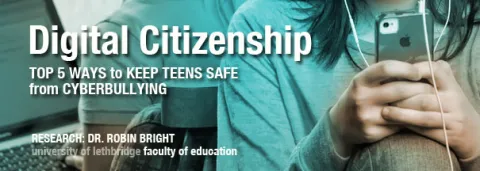Digital Citizenship: Top 5 Ways to Keep Teens Safe from Cyberbullying

“We want to make sure we’re talking to kids about education, and talking to school boards and superintendents about policy. Then I think change is possible.” ~ Dr. Robin Bright
TOP 5 WAYS TO KEEP TEENS SAFE FROM CYBERBULLYING
1. Keep passwords private. Do not share these with friends. Change passwords frequently.
2. Do not post or send information or photos that others can use against you.
3. Pay attention to how you communicate online. Be careful not to insult others. Be kind.
4. Stay away from sites that try to get personal information by promising free gifts, or offering surveys and contests.
5. Read and use privacy settings for social-networking sites.
DIGITAL CITIZENSHIP
“Even if they don’t think cyberbullying is going on, it is, and teachers can play a role in teaching students about building positive online relationships,” says Dr. Robin Bright, University of Lethbridge Faculty of Education.
Bright and Kinesiology/Physical Education professor Mary Dyck embarked on a comprehensive study of how teens use online communication. Four of seventy-three questions administered to 1752 southern Alberta middle school students queried whether they had ever been involved in cyberbullying, either as a bully, a bystander or a target. “They readily admitted if they were in one of those groups,” says Bright. “There was even overlap.”
Bright’s and Dyck’s findings have generated interest from Alberta Education, the BC Ministry of Education, the Alberta School Boards Association, and others. “We’ve done dozens of workshops. We belong to a worldwide anti-bullying network and we’re available for conversations and meetings across the country,” says Bright, who is assisting the Society for Safe and Caring Schools and Communities with developing a guidebook for bully-free environments.
One of the most effective ways of combating cyberbullying is classroom education. “Kids want to participate in respectful online relationships, but they don’t really know who to go to for help when someone posts mean words or images. They don’t necessarily look to adults, because adults think about and use technology differently than children do.”
Teachers are uniquely positioned to bridge the gap. Bright encourages Education students to think critically about their own technology use so they can help students think critically about theirs. “Is your cell phone for you, or is it for someone else to get hold of you? Do you have to be at someone’s beck and call? Do you control the technology or does the technology control you?”
“Kids listen to teachers,” she adds. “The first thing to talk about at an early age is what is private information and what is public. Students can be encouraged to keep their passwords private.” Being cautious of online advertising and aware of how surveys enable computers to store and disseminate personal information are other important messages.
“It’s about developing good online citizenship,” says Bright. “The earlier we start talking about that the better.”
Another focus for the researchers is policy building. “We want to help school districts develop policy that shows an understanding of what to do when cyberbullying takes place,” says Bright. “We need policies that will work for particular districts. A rural school district might have different needs than an urban one.”
“We want to make sure we’re talking to kids about education, and talking to school boards and superintendents about policy,” says Bright. “Then I think change is possible.”
Contact:
Darcy Novakowski, Communications Officer
Faculty of Education
University of Lethbridge, 4401 University Drive
Lethbridge, Alberta Canada T1K 3M4
(403) 332-4550
email: darcy.novakowski@uleth.ca
